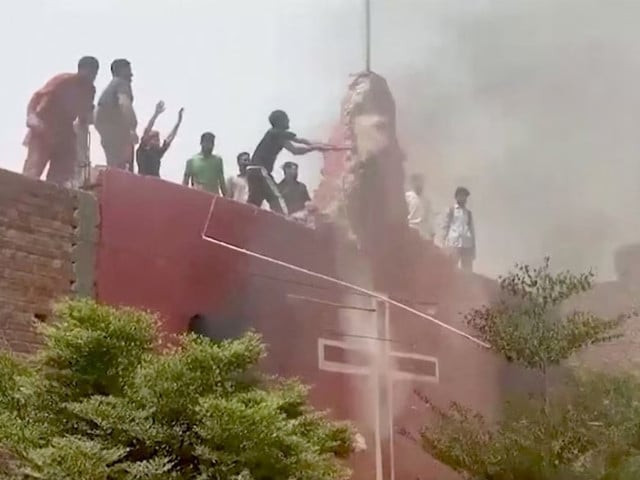Pakistan has faced numerous problems over the years. We have witnessed a lot of political instability, particularly following the removal of Imran Khan, which is likely to continue well into the future. The economic situation is extremely adverse, and although the country was able to avoid financial default, it has ended up paying a very steep price due to strict IMF conditions. The prevalent pessimism is making many young individuals risk everything, including their lives, to leave Pakistan. At a time when neighbouring India is making a successful landing on the moon, Pakistan is struggling to stay afloat.
While all these problems are making life difficult for the average Pakistani, what the religious minorities are enduring is far worse. During the past 30 days, we have witnessed a horrifying incident at Jaranwala where numerous churches were burnt, houses demolished, and copies of the Holy Bible desecrated because of alleged blasphemy by two members of the Christian community. Christians in Pakistan belong to the poorest segment of society and are considered untouchables in Pakistan.
What happened there is nothing new. Such attacks on the Christian community have taken place before. I still remember what happened in Gojra in 2009 and Joseph Colony in 2013. However, what made the Jaranwala incident different was the way the mob was properly organised by the local clergy as well as by the Tehreek-e-Labbaik Pakistan (TLP) leadership without any hindrances. There was a sickening sense of normalcy about the whole episode. Law enforcement agencies watched in silence, unable to do anything. It seemed as if they were tacit approvers of whatever was happening.
The irony increased manifold when, on the same day, Pakistan's former prime minister Shehbaz Sharif tweeted about the desecration of the Holy Quran in Sweden and lamented about the “inaction” of the Swedish government. The fact that our political leadership is fixated on what's happening in other countries while ignoring what's taking place in our own backyard speaks volumes about their priorities. As we lament Islamophobia in the western world, our hypocrisy and misdeeds within our own country is validating such sentiments.
Meanwhile, it was business as usual for the Ahmadiya community as they witnessed the desecration of their worship places, and it appears that not only were the police complicit but actually participated also. While the Jaranwala incident still drew condemnation, these desecrations, due to Ahmadi exceptionalism in Pakistan, were met with a deafening silence from the political quarters. Of all the minorities, the Ahmadis remain the most hated, with no one standing up for them.
The past three weeks also witnessed Pakistan's senate passing the amendment to the blasphemy law bill, which suggests heavy punishments for individuals found guilty of disrespecting the companions of the Holy Prophet (PBUH). The said bill, though not yet signed by the president, is highly controversial because it is clear that it will target Pakistan's already persecuted Shia community. The way the clerics from extremist political organisations like Sipah Sahaba are openly threatening Shias of “consequences” if they try protesting the bill is horrifying. Given how Pakistan's existing blasphemy laws have been weaponised against various communities, there is no doubt that this law will be used to target the already marginalised Shia community once in force.
How did we reach this stage? Why are our minorities under so much threat from mob violence? Religious bigotry has always existed in society, but now we are witnessing a kind of entitlement by the charged-up mobs. Some say that what is happening in Pakistan was inevitable as its creation was based on religious identity and therefore was exclusionary in nature. I disagree with this view mainly because all countries have some basis for coming into being. After all, there are countries whose basis is ethnicity. Likewise, a lot of European countries became nation-states on a linguistic basis. It's the way you cultivate civic nationalism after creation that makes the difference.
In Pakistan's case, our strategy of using religion as a tool to foster nationalism has led to various problems. The original intention was to utilise the shared factor of religion to promote unity among diverse ethnicities in Pakistan. However, this approach to nationalism inevitably exerts pressure on the state to anchor the Constitution and legal code in religion. The process of Islamising the legal system, once initiated, quickly gained momentum, compelling the state to encompass all aspects, including matters related to religious categorisation and blasphemy.
Ironically, the original rationale behind these laws was to curb mob violence, but they have paradoxically granted a sense of entitlement. When mobs vandalise Ahmadi places of worship or subject them to harassment, they openly refer to Pakistan's Constitution and its infamous Second Amendment. Similarly, when mobs lynch individuals accused of blasphemy or target properties and religious sites belonging to minority communities, they derive encouragement from the presence of blasphemy laws. Their reasoning often revolves around administering “justice” themselves, as they believe that the courts won't adequately punish the culprits due to a perceived bias in the system.
Once these laws were introduced, it became impossible to repeal or even amend them because of the way they were politicised. Despite the obvious hurdles, we must have a national conversation about this issue involving prominent religious scholars. It's important to remember that numerous Muslim nations share the same level of religiosity as Pakistan but do not have similarly contentious blasphemy laws. This comparison shows that Pakistani laws are an exception and not the norm. Therefore, it is possible to amend them on religious grounds and through consensus. Failure to do so will destroy our social fabric completely and tear us apart on communal and religious lines. Our time is running out; therefore we need to act quickly.



COMMENTS
Comments are moderated and generally will be posted if they are on-topic and not abusive.
For more information, please see our Comments FAQ